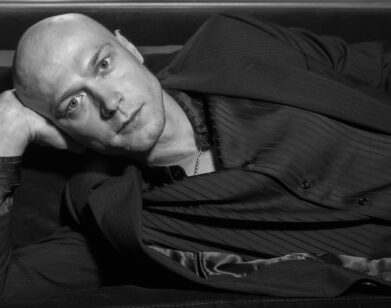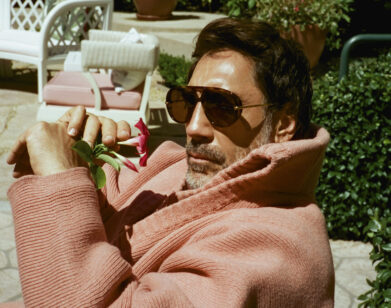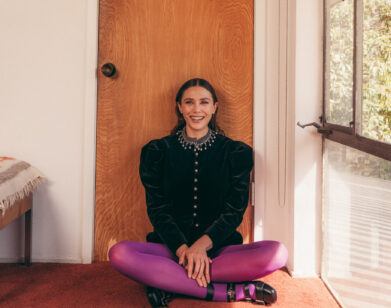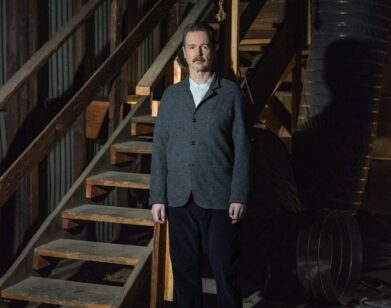Jordan Vogt-Roberts and the Video Game Generation
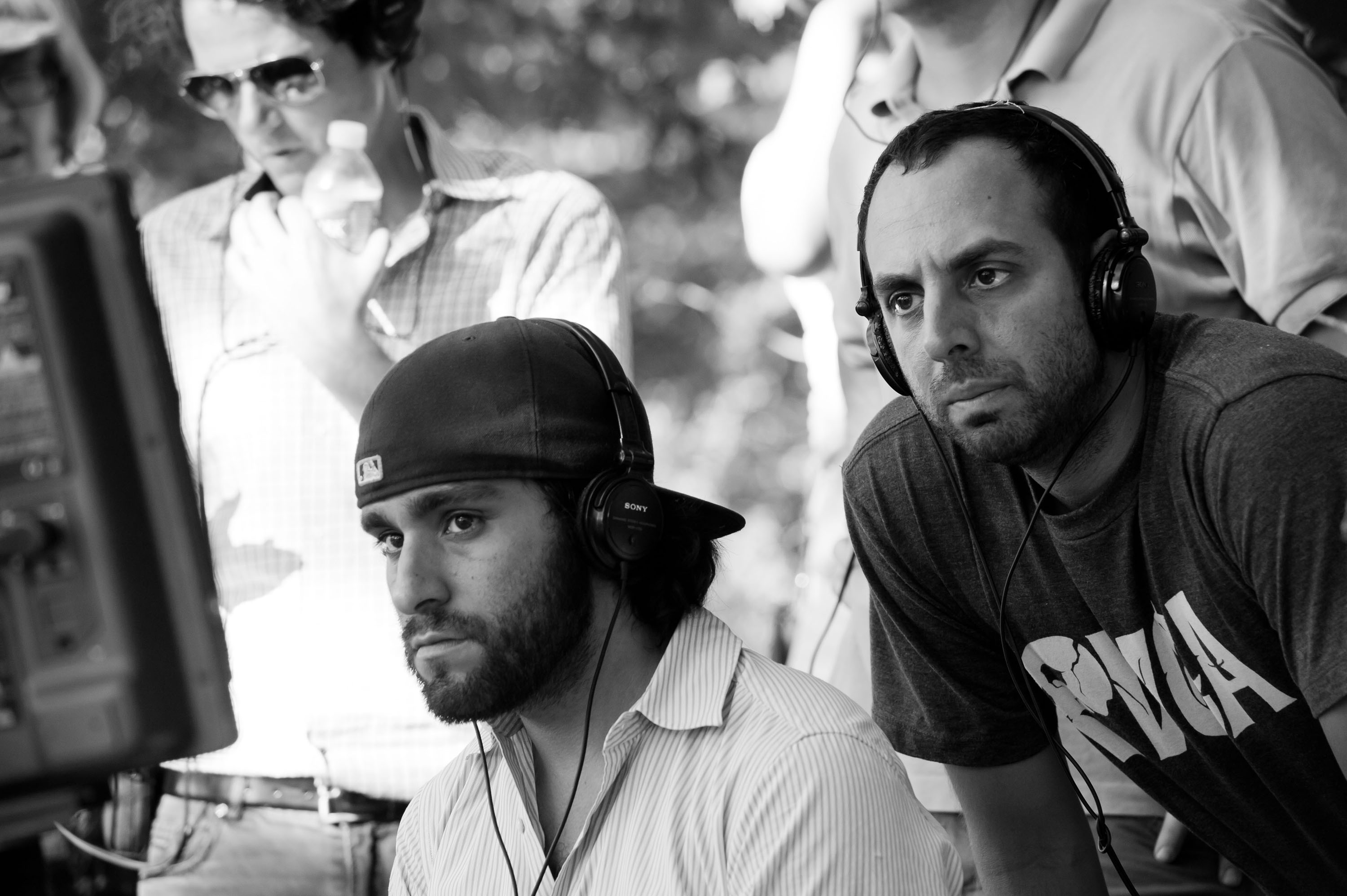
ABOVE: JORDAN VOGT-ROBERTS. IMAGE COURTESY OF CBS FILMS
The coming-of-age genre has its fair share of canonical works, and in film, no decade combined adolescent ennui and off-kilter humor quite like the 1980s. For director Jordan Vogt-Roberts, the era of John Hughes and Steven Spielberg’s Amblin Entertainment epics (The Goonies; E.T.) casts a heavy cinematic influence.
Vogt-Roberts, a Funny or Die Presents… alum and director of Comedy Central’s Mash Up series, found success at Sundance in 2010 with a boozy short starring Lizzy Caplan and T.J. Miller, Successful Alcoholics. His first feature, The Kings of Summer, draws from those adolescent influences and combines them with a contemporary alt-comedy sensibility. Set in suburban Ohio, the film is a Stand By Me reformulated for the aughts, infused with an unironic sense of innocence that captures the misarticulated longings and small freedoms of early adolescence. Fifteen-year-old Joe (Nick Robinson), a scheming dreamer anxious to escape his overbearing widower father (played gruffly to a tee by Nick Offerman), hatches a plan to run away for the summer. With his best friend Patrick (Gabriel Basso) and a new sidekick, Biaggio (Moises Arias), in tow, the group sets out to build a home in the woods, drink beer, live off the land, and embrace their burgeoning manhood. As they soon find out, it’s not quite that easy.
With Alison Brie and Megan Mullally supporting, plus appearances from the likes of Tony Hale, Hannibal Burress, and Kumail Nanjiani, Vogt-Roberts crafts a film that bridges biting comedy and heartfelt sincerity for a fresh, smart revamp of the classic teenage tale.
We spoke with Vogt-Roberts by phone while the director was in Austin, Texas, about capturing the video game generation on film, playing outside unsupervised, Calvin and Hobbes, and his process of making “the dumbest Terrence Malick movie ever.”
COLLEEN KELSEY: You’ve done a number of short films, and worked on TV as well, but how did your first feature come about?
JORDAN VOGT-ROBERTS: I got into this because I wanted to make movies. I fell in love with movies as a kid. I had been making shorts and making TV and making commercials and it’s such a difficult, weird process of trying to wing your first feature, especially if you’re not going to go and just have a Kickstarter and do it on your own. One of my shorts [Successful Alcoholics] had played at Sundance a couple years ago; the guys at Big Beach, which is the company that made Little Miss Sunshine and Safety Not Guaranteed, they had seen that short. They contacted me with this script and sent it to me, and asked if I would be interested. I honestly thought it was a joke. [laughs] I thought that they were messing around with me, because as soon as I read the script, I just fell in love with it. Chris [Galletta] wrote such an incredible world. It was so perfectly aligned with my sensibilities, and it so perfectly captured what I wanted to do with my first feature, which was… I could take this script and make it feel cinematic and really play with the spectrum as far as tone goes, and have it be really funny and then also really kind of raw and real. You know, no one wants to actually trust a first-time director. Everyone says they do, everyone wants the credit of saying, “Oh, yeah, we want to break new talent.” But at the end of the day, no one really wants to take that risk.
KELSEY: How was it to collaborate with Chris? The script is so strong, and with the direction, I feel like it was a perfect marriage.
VOGT-ROBERTS: Right away when I read the script, I could just tell our sensibilities were so in sync, not only communicably, but also thematically. We are just very much on the same page about a lot of things. I think that we both struggle with a lot of the same issues that I think this movie is about: What is masculinity in 2013? How do you make a movie that doesn’t feel small and like a disposable indie? How do you make it actually feel cinematic like the movies that we grew up on? It really was just a very idiosyncratic relationship. The script itself, there’s stuff in the movie that is word for word, exactly what Chris wrote, and then there’s a lot of stuff that I sort of took and said, Okay, let’s push this, let’s open this up, let’s improvise, let’s make it loose, so we can combine Chris’s really specific words with a looseness and a sense of reality, and a sense of improv. Let’s push all of this and have it be really visual. Let’s take these words and combine it with very weird, ethereal, lyrical Terrence Malick elements. [laughs] We would always joke around—this wasn’t something that was scripted at all—but we really loved the idea of saying, “Can we make the dumbest Terrence Malick movie ever?” Can we combine really lyrical visuals and ethereal visuals, and impressionistic ones, with really bizarre comedy back to back?
KELSEY: There’s a very strong sense of innocence and nostalgia in the film, as well as an authenticity. From your own experience of adolescence, did you relate to it at all?
VOGT-ROBERTS: Oh, completely. I am a super nostalgic person in general. I think part of the reason that I’m in this business is because, to me, when I was trying to figure out what I wanted to do, it seemed like the most appropriate career I could have where I knew I wouldn’t have to kill the little kid in me. I get to play around, and that’s amazing. There’s a quote from Bill Watterson, the creator of Calvin and Hobbes that I always found really interesting. He said, “Anyone who is nostalgic about their childhood never had one.” And I always found it fascinating. That is so pure and raw and earnest in terms of what I think childhood is, combined with such a cynical approach, and I love that. I love trying to reconcile that idea of how someone who could create something so innocent, could have that attitude towards it. I was very nostalgic for that period of my life, because I think that there’s no other time like that. But at the same time, I recognize the dichotomy of what it is, which is to say I think to a certain point, a very personal part of this movie to me, just the core idea of saying, “Dammit! Being 14 is the best,” and immediately following that up with, “Thank God I’m done with that,” because it was the most painful, awkward, horrible time in my life. But it’s what makes you who you are.
KELSEY: Did you look at other films for inspiration?
VOGT-ROBERTS: Absolutely. This whole movie is a mash-up to some degree. I think its influences are very much worn on its sleeve, and I hope that it is able to carve out its own voice for people. But it absolutely is a throwback. It’s a throwback to an era of technical craftsmanship and filmmaking and your investment in characters and story in the way that Amblin [Entertainment] movies did, and movies like Stand By Me, the heart of a John Hughes movie, combined with I guess some weird Terrence Malick and Robert Altman, and then just matched up with really contemporary kind of alt-comedy. I really wanted to elicit the feeling that those old Amblin movies did, and still have it feel very contemporary with its comedy, so it ultimately felt very timeless as opposed to just feeling like a throwback, or just feeling like a movie that was very deeply rooted in 2013.
KELSEY: I feel like you’ve assembled such a great comedic ensemble, as well. You’re deep in the comedy scene and are friends with a number of people that you casted in the film, but how was the casting process for you? Was there anyone that you knew you wanted immediately or wanted to work with?
VOGT-ROBERTS: We have such incredible comedians and actors in the movie, not only people that understand comedy, but understand how to combine that with drama and to make it real. Nick Offerman is so talented, and I love his character’s part, because I think that it surprises people by the end. It starts off very funny, and then at a certain point you’re like, “Oh, there is something here.” And I love that weight that so many of these actors are able to bring. All the Amblin movies, the thing about them is they’re about a set of characters in a world that you’re invested in. Everything else is icing. If it’s funny, adventurous, heartbreaking, heart-warming, whatever… that’s all a bonus. And the fact that Chris’s script was so strong and that I had a desire to make this feel like a movie as opposed to just a disposable comedy, I think, really attracted a lot of people.
People really responded to the idea that everybody was someone, every part mattered, because we were building a world. But as amazing as the adults are, it was just very apparent from the beginning that the movie was going to live and die by the kids.
That was a really long process, of tracking these kids down and finding kids who felt real and authentic and weren’t 22-year olds, didn’t just feel like Hollywood movie stars trying to play [teenagers]. It was really important to me that the kids were close to the age of the characters because there’s a huge difference, mentally and physically, between a 15 or 16-year old and a 20-year old.
KELSEY: You mentioned before about how you were kind of obsessed with how masculinity is portrayed in 2013.
VOGT-ROBERTS: I think one of the big things to me, is that when I read the script, it just seemed like a really contemporary riff and a postmodern version of something like Stand By Me. One thing that I always thought was really interesting was just this idea of saying, the kids in Stand By Me or the kids in The Goonies, those were generations where what those kids do in that movie, is somewhat plausible, because you know they were raised by “The Greatest Generation.” They were raised by people who fought in insane wars and were raised to be very sort of self-sufficient. And I’m from a very coddled generation. I feel like in a weird way, I’m kind of one of the last generations that grew up allowed to play outside, unsupervised. Whereas the kids in Stand By Me or The Goonies I think very reasonably could actually follow through on the adventures that they go on. I feel like I was interested in telling the movie about a set of kids who can’t go on that adventure, but do it anyway. How does the video game generation deal with this? A lot of the movie is about them cheating. Even though they are doing this adventure, they’re really not. It’s not until the end of the movie where Joe really kinda has to follow through on this game that he’s been spinning the entire time, because they are kinda faking it. I was just obsessed with that idea of, How do they react to this? How do they cheat it? What happens when the generation who is coddled tries to do this anyway? I loved the idea of how the video game generation perceives things.
THE KINGS OF SUMMER IS OUT NOW IN LIMITED RELEASE.

